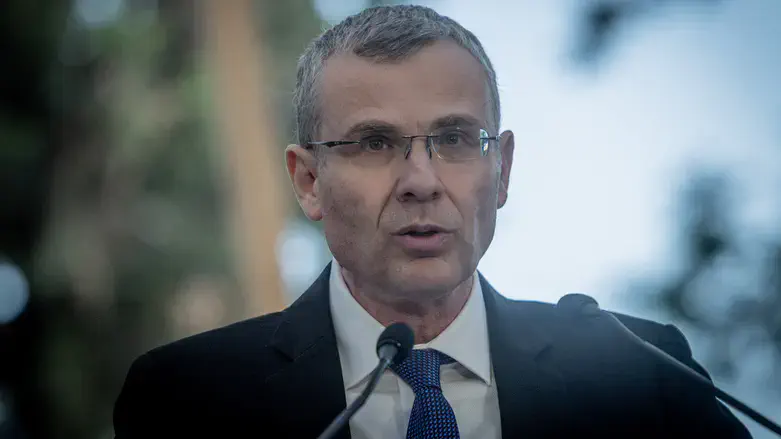
Minister of Justice Yariv Levin has announced to the Supreme Court that no agreements have yet been reached between him and Acting Supreme Court President Uzi Fogelman regarding who will be the next president, and therefore he is not convening the Committee for the Selection of Judges.
Nevertheless, in his letter to the Supreme Court, Levin explained the compromise proposal he gave to the Acting President of the Supreme Court, who will retire at the beginning of October.
In response, Acting Supreme Court President Judge Uzi Fogelman announced that he rejects the compromise proposal.
According to the compromise proposed by Levin, upon the end of Elron's term, a current judge of the Supreme Court will serve in the position, who will be proposed by the judiciary representatives in the committee until his retirement. Both appointments will be made at the same meeting of the Judges Selection Committee. Additionally, Levin proposed in the framework of the compromise to appoint three judges to the Supreme Court:
One judge will be appointed at the proposal of the majority of the judiciary representatives in the committee, who will propose two candidates. The candidate chosen will be the one preferred by the majority of the public officials in the committee.
The second will be appointed at the proposal of the majority of the public officials in the committee, who will propose two candidates. The candidate chosen will be the one preferred by the majority of the judiciary in the committee.
The third will be appointed by agreement among the entire committee members from among the serving district judges.
In response, as mentioned, Judge Fogelman rejected Levin's proposal and wrote that "the seniority system is intended to protect judicial independence and prevent the politicization of the Supreme Court judges and its presidents. This system has proven itself since the establishment of the state, and you know that our position is that there is no justification to deviate from it. This is also the position of the majority of the Selection Committee members. In this sense, presenting a proposal based on the abolition of the seniority system does not represent any progress. Moreover, even separately from the above, the proposal to appoint two judges simultaneously as President of the Supreme Court to serve consecutively raises significant legal difficulties. The proposal actually harms the equality among the committee members and nullifies the voice of some of its members," Fogelman added. "I insist again that the Selection Committee be convened as soon as possible, as required by the law."
Levin's staff responded to Fogelman and said that "the claims of the Acting President are irrelevant and incorrect. Firstly, in the last two weeks alone, a President was appointed to the Haifa District Court and Vice Presidents to several courts, and also a series of other appointments requiring joint agreement and consultations between the Minister and the Acting President were made."
"All of this is in addition to the appointment of 162 judges in the last few months, an unprecedented number for one year. What really bothers Acting President Fogelman is one thing: Minister Levin's desire to diversify the composition of the court and ensure that it represents different worldviews. The judges' hiding and their opposition to any compromise only prove how justified the demand for diversification is."
They further added that "the Acting President thinks that judicial orders can be used to select a president who is acceptable to the public, and he himself will bring the court to a low point in public trust. Instead of entrenching himself, it would be better for him to accept the fair and balanced compromise proposal offered by Minister Levin, or to propose another fair and balanced compromise. This is his responsibility as the head of the Supreme Court of all Israel's citizens."
Chairman of the Constitution, Law and Justice Committee, MK Simcha Rothman, wrote: "There is no partner to be had." Chairman of the Israel Bar Association, Amit Bechar, responded to Minister of Justice Yariv Levin's compromise proposal: "I am very sorry to say that Minister of Justice Yariv Levin's proposal is not a compromise but a continuation of the attempt at a governmental coup and a unilateral change of the selection process."
"At the heart of the attempt at a governmental coup is a desire to harm the independence of the judiciary. The only system that disconnects the selection of a Supreme Court president from politicization and the veto right of the government is the seniority system with all its advantages and disadvantages. According to this system, the next president who should be elected is the Honorable Judge Yitzhak Amit, just as after him the Honorable Judge Noam Sohlberg will assume the position when the time comes."
"If that were not enough, another main flaw in the proposal is the illegal use the Minister of Justice is making in his position as chairman of the committee to prevent a vote on the selection of the president and in this way impose the judges of his choice on the committee majority - this is not the way."
